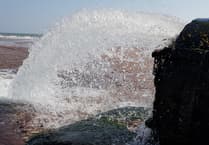Friends of the River Dart have reportedly found the presence of Salmonella typhi in our bathing waters. Salmonella typhi is a bacteria, found in faecal matter, which causes typhoid fever. However, it is a bacteria that often goes undetected in testing carried out by the Environment Agency.
Current routine testing focuses on E. coli and Enterococci – bacteria that indicate the likely presence of faecal contamination. Additionally, results take up to 48 hours to process, by which time the water has changed, rendering findings largely out of date and potentially unreliable.
Reports by the Environment Agency have shown that, despite the number of South West Water spills decreasing last year, the number of hours sewage was dumped into waterways soared. The company now holds the dubious title of ‘highest sewage spillage duration in England’ - flaunting a staggering 544,429 hours, or 62 years' worth of waste dumped into rivers and seas.
South West Water has been under heavy fire for their seemingly constant sewage dumping in waters across Devon and Cornwall. Ofwat, the water regulatory service for England and Wales, has already fined South West Water £2.15 million in 2023 for environmental offences. These fines are yet to be collected by any regulatory agency which, MP Caroline Voaden warns, “lets the water companies think they can get away with it.”
MolEndTech, a company born out of research at University of Plymouth, has offered up a viable solution to testing concerns. A new, state-of-the-art kit, Bactiquick, has come to market which offers rapid results and tests for any bacterial presence in a water sample.
“Current testing is not fit for purpose” says Rui Andres, CEO of MolEndTech. “Results take over 24 hours and sampling is infrequent. People care about their own health, and with Bactiquick, they can test the water themselves to find out if it’s safe.”
Results from the Bactiquick kit take 15 minutes and are colour-coded using a traffic light system - then uploaded live to an online database. Any high-risk samples are flagged and sent for further lab testing on the same day.
Andres’s goal is to get Bactiquick kits integrated into communities and water agencies across the country.
Typhoid fever, while rare in the UK, is a serious illness transmitted through contaminated food and water. Symptoms typically appear within one to two weeks from exposure to Salmonella typhi bacteria and include high fever, fatigue, headaches, and stomach pain. In severe cases, it can be fatal.
Government figures show confirmed cases of Salmonella typhi in England, Wales and Northern Ireland have nearly quadrupled since 2021 – reaching 405 in 2023.
Andres explains, “Food and water contamination are the biggest risks to public health, but food is mostly cooked. This is much more serious than diarrhea and vomiting.”
While bathers, boats or beloved pets can contribute to bacterial levels in open water, experts estimate that sewage discharges account for 50% of water pollution.
As contamination seemingly continues to rise and trust in testing at an all time low, campaigners say it is time the public had access to timely, transparent data – and that water companies were held to account.
If you have any symptoms of typhoid then seek medical advice immediately.




